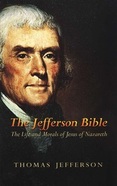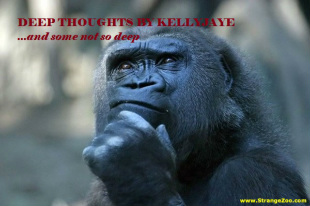|
Besides being considered a Founder Father of the United States of America and main author of the Declaration of Independence, Thomas Jefferson's resume of roles included, in no particular order: Governor of Virginia; Vice President for President John Adams; Third President of the United States for two terms; statesman responsible for the Louisiana Purchase; United States Minister to Paris; first United States Secretary of State; organizer of the Democratic-Republican Party; founder of the University of Virginia; and main author of the Kentucky and Virginia Resolutions, and of the Virginia Act for Establishing Religious Freedom. Henry Childs Merwin, Thomas Jefferson 36 - 164 (Houghton Mifflin Company, The Riverside Press Cambridge, 1901). Thomas Jefferson was - and still is - regarded as one of the most intelligent intellects ever known to man. Former President John F. Kennedy stated this best when he addressed Nobel Prize Winners at a dinner in 1962:
John F. Kennedy, Remarks at a Dinner Honoring Nobel Prize Winners of the Western Hemisphere, http://www.presidency.ucsb.edu/ws/?pid=8623 (Gerhard Peters and John T. Woolley, last accessed Sept. 5, 2014) Thomas Jefferson was a staunch supporter of the separation of powers, including the separation of church and state. The peoples of the "New World" were victims of a government combing religious power with political power; thus the majority supported the division as well. One of the many examples of his campaign to abolish government from dictating any particular religion was his "Act for Establishing Religious Freedom" for Virginia," which became the "Statute of Virginia for Religious Freedom" in 1786. The law repealed the penalties imposed on Virginians for attending a "dissenting meeting-house," and the law that had the citizens pay tithes. Henry Childs Merwin, Thomas Jefferson 35 (Houghton Mifflin Company, The Riverside Press Cambridge, 1901). Jefferson stated, “. . .[O]ur civil rights have no dependence on our religious opinions any more than our opinions in physics or geometry.” He ends it with, “ . . .. [A]ll men shall be free to profess, and by argument to maintain, their opinions in matters of religion, and that the same shall in no wise diminish, enlarge or affect their civil capacities.” Heritage Foundation, First Principles: Primary Sources / Virginia Act for Establishing Religious Freedom, http://www.heritage.org/initiatives/first-principles/primary-sources/virginia-act-establishing-religious-freedom (last accessed Sept. 5, 2014).
In 1802, then-President Jefferson wrote a letter to the Baptists in Danbury, Connecticut:
Jefferson's Letter to the Danbury Baptists, The Final Letter, as Sent (1802) available at http://www.loc.gov/loc/lcib/9806/danpre.html By no means does this infer or give evidence to the theory that Thomas Jefferson was an atheist, or at the very least, a religious skeptic. He was raised an Episcopalian, and brought up his children as such. He was known to read the bible daily. It was believed that at some point he no longer ascribed himself to Christianity. That led to a rumor that all the elderly women hid their Bibles in their wells when he became President. There are various books that have a Deist.1 (i.e.: Henry Childs Merwin, Thomas Jefferson 8 - 9 (Houghton Mifflin Company, The Riverside Press Cambridge, 1901). ) Even that does not stand up to scrutiny! He actually at one time propose a bill for public fasting and Thanksgiving while in the Virginia legislature. Mark A. Beliles & Douglas S. Anderson, Contending for the Constitution 66 (2005). Many of his published papers and other documents underline his strong belief in God. Some of these are:
If the dead could turn over in his/her grave, Thomas Jefferson would be turning as fast as a tornado concerning the intolerant secularism which seen today. Beliles and Anderson, supra at 67. Rather, he accepted and defended the interests of the church in cases where it was involved. Beliles and Anderson, supra at 62. Jefferson also spoke on behalf of Presbyterian and Baptist ministers from the Commonwealth of Virginia who desired an equal playing field where no one denomination was shown favor. Beliles and Anderson, supra at 63. ~KellyJaye, as written for my Legal Studies classes at Liberty University (so I plagiarized myself). 1 A Deist is considered having a perspective (rather than a religion) that attests all knowledge of God comes through in one owns understanding, experiences and reason, not by any theology professed by man. Catherine Beyer, Deism http://altreligion.about.com/od/alternativereligionsaz/p/Deism.htm (last cessed Sept. 5, 2014). Comments are closed.
|
AuthorKellyJaye Categories
All
Archives
April 2021
Quickly jump to visit my Right Rooms within this website:
|




 RSS Feed
RSS Feed
